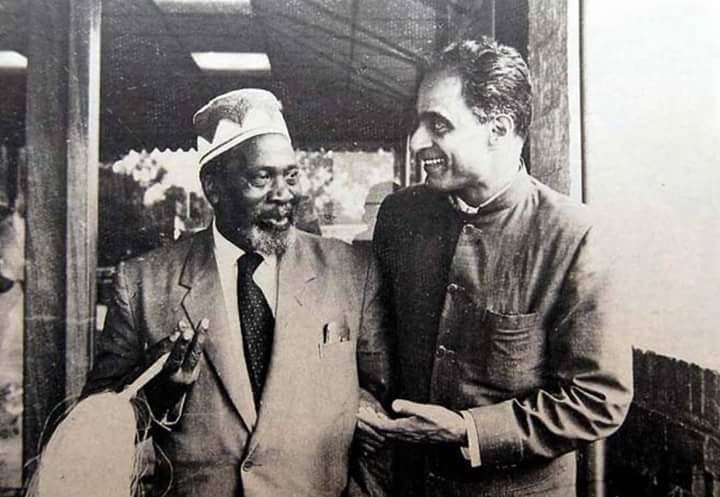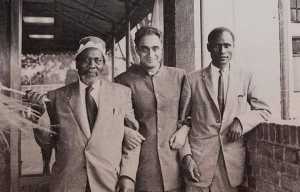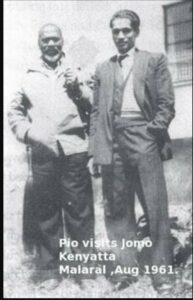
Indians involvement in Independence struggle first became public On 15 august 1947 at a meeting which was held in Nairobi to celebrate India’s independence, the meeting was attended by many Indians and Africans among them mzee Jomo kenyatta who was a key speaker.
After speeches by all invited indian leaders it was Mzee’s turn to deliver his speech in his speech he praised indians for what they had achieved and stated he would ensure Kenyans follow the same example to achieve independence .
He also added that Kenya really needed assistance of the Indians in the fight against colonialism.
This was followed by a second meeting of (K.A.U) which was held at fort hall on the 20.7.1947 this meeting was attended by Jomo Kenyatta ,Nene the Indian lawyer who acted for the union, Jesse Kariuki, Henry muoria, B.A. Ohanga and chief Parmenes Githendu.
In his address at the meeting Kenyatta called for the deletion of the word colony from “Kenya Colony” as the word to him meant that outsiders were welcome, the country he said should simply be called Kenya.
He also informed his hearers that Indians were now there friends and that a trading company was going to be formed of Indians and Africans in equal numbers.
During this period Kenyatta’s increased political activities and the intensified attacks by Mau Mau had already started raising speculations on the involvement of external forces in causing the troubles the colony was now experiencing.
This led to a bitter row between the colonial and the foreign office, while the foreign office insisted that Mau Mau movement was being controlled by communist through Kenyatta, the colonial office was of the opinion that foreign office claims were unverified theories lacking evidence of communist intervention in Kenya.
Instead the colonial office viewed Indians involvement in political activities as a major threat than the communists, this was well captured in a phone call mr Burton of the colonial office made to the Security service in London ,which had already started carrying out investigations on Maumau activities.
In the phone call Mr Burton suggested to the security service that any research on external cause of the trouble in Kenya should keenly focus on certain members of Indian community.
The security service replied back the same day with a draft letter labelled Urgent, Secret and Personal to mr Burton containing information expunging the involvement of communists in the mau mau movement.
The letter read: ”We have nothing which suggests that there is any communist intervention in mau mau activities although as i said we have no given evidence ,there is some reason to suspect that any agitators who may have been introduced into Kenya from outside are to be found among the Indian community.”
The secret service also alleged that there were strong indication that mau mau had some connections with the Indian-Inspired passive resistance movement in South Africa.
All this time Indian encouragement support and propaganda for political activities continued,this was being influenced by the Indian Government through the office of its commissioner to Kenya Mr A.B. Pants who also the cordinator.
Commissioner Pants activities had long presented a problem to the previous governor to Kenya Philip Mitchell who at one time considered replacing him.
But he later relented after realizing that replacing Pants would have only meant exchanging an unknown for known devil who was too indiscreet to conceal his abuse of quasi-diplomatic status.
Between December and January 1952 commissioner Pant travelled to the United states leaving his deputy Muhamed Attour Rahman to co-ordinate all KAU political activities.
During this time he held a number of clandestine meetings between Awori, Odede ,Murumbi and other leading members of the Indian congress who included Pinto and Sharda .
During one meeting a huge sum of money given out by the Indian government towards the defence of Kenyatta who was now in prison was disclosed by Rehman.
These meetings were also meant to help the leaders of K.A.U. to reorganise it into an African congress however there was a major obstacle to be overcomed, the natives of Nyanza the Kisii, Luo, Nandi and Kalenjin were a bit hesitant to support Kikuyu political activities and were therefore not ready to join K.A.U.
To overcome this the Indians put up a spirited effort to bring together kikuyu and Luos to co-operate and mount a united front towards achieving independence, Jesse Kariuki was also appointed as KAU travelling inspector to strenthen K.A.U in Nyanza and Coast province.
Article contributed by Odhiambo Levin Opiyo, a journalist based in London







